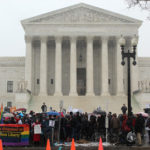Posted: 6/23/06
Court agrees to hear test
of partial-birth abortion ban
By Robert Marus
ABP Washington Bureau
WASHINGTON (ABP)—The Supreme Court will expand its review of a controversial federal abortion law.
The justices agreed June 20 to hear a California case involving the Partial-Birth Abortion Ban Act of 2003. They will consider, in Gonzales v. Planned Parenthood, whether the ban is unconstitutionally vague and places too heavy a burden on women seeking abortions.
The court has already said it would hear a Nebraska case (Gonzales v. Carhart) challenging the same law on the grounds that it does not permit an exemption designed to protect the health of the mother seeking an abortion.
Federal appeals courts ruled the law unconstitutional in both cases. Attorney General Alberto Gonzales appealed those decisions.
Congress passed the law to ban an abortion procedure, known medically as “intact dilation and extraction,” that involves the partial delivery of a fetus, whose skull is then punctured and its contents evacuated to make it easier to pass the head through the birth canal. Doctors say it is used only in exceedingly rare circumstances.
The last time the Supreme Court dealt with a similar law—in this case, a Nebraska state ban on the procedure—was in 2000. In Stenberg v. Carhart, the justices ruled 5-4 that the law was worded so vaguely as to possibly ban other abortion procedures, and also violated the Constitution because it did not include a health exception.
The federal partial-birth ban does not provide a health exception. Instead, it cites congressional findings determining that the procedure is never medically necessary to protect a woman's health.
Both cases will be heard by a Supreme Court different in ideological make-up than the one that ruled the law unconstitutional in 2000. The justice who decided that case by casting her vote with the five-member majority—Sandra Day O’Connor—voted frequently in favor of abortion rights.
Since then, she has retired and been replaced by Justice Samuel Alito, who was nominated by abortion-rights opponent President Bush and confirmed by a divided Senate in January. Much of the controversy over Alito’s appointment centered on whether he would vote to uphold abortion rights or restrict them.
Arguments in both cases will take place in October, after the court begins its 2006-2007 term.















We seek to connect God’s story and God’s people around the world. To learn more about God’s story, click here.
Send comments and feedback to Eric Black, our editor. For comments to be published, please specify “letter to the editor.” Maximum length for publication is 300 words.